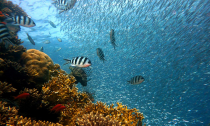
Climate change is devastating our seas and frozen regions as never before, a major new United Nations report warns. According to a UN panel of scientists, waters are rising, the ice is melting, and species are moving habitat due to human activities. And the loss of permanently frozen lands threatens to unleash even more carbon, hastening the decline.
There is some guarded hope that the worst impacts can be avoided, with deep and immediate cuts to carbon emissions.
This is the third in a series of special reports that have been produced by the Intergovernmental Panel on Climate Change (IPCC) over the past 12 months.
The scientists previously looked at how the world would cope if temperatures rose by 1.5C by the end of this century. They also reported on how the lands of the Earth would be affected by climate change.
However, this new study, looking at the impact of rising temperatures on our oceans and frozen regions, is perhaps the most worrying and depressing of the three.
In a nutshell, the waters are getting warmer, the world’s ice is melting rapidly, and these have implications for almost every living thing on the planet.
“The blue planet is in serious danger right now, suffering many insults from many different directions and it’s our fault,” said Dr Jean-Pierre Gattuso, a co-ordinating lead author of the report.
The scientists are “virtually certain” that the global ocean has now warmed without pause since 1970.
The waters have soaked up more than 90% of the extra heat generated by humans over the past decades, and the rate at which it has taken up this heat has doubled since 1993.
The seas were once rising mainly due to thermal expansion – which refers to the way the volume of water expands when it is heated. The extra energy makes the water molecules move around more, causing them to take up more space. But the IPCC says rising water levels are now being driven principally by the melting of Greenland and Antarctica.
Thanks to warming, the loss of mass (which refers to the amount of ice that melts and is lost as liquid water) from the Antarctic ice sheet in the years between 2007 and 2016 tripled compared to the 10 years previously.
Greenland saw a doubling of mass loss over the same period. The report expects this to continue throughout the 21st Century and beyond.
For glaciers in areas like the tropical Andes, Central Europe and North Asia, the projections are that they will lose 80% of their ice by 2100 under a high carbon emissions scenario. This will have huge consequences for millions of people.
All this extra water gushing down to the seas is driving up average ocean water levels around the world. That will continue over the decades to come.
This new report says that global average sea levels could increase by up to 1.1m by 2100, in the worst warming scenario. This is a rise of 10cm on previous IPCC projections because of the larger ice loss now happening in Antarctica.
“What surprised me the most is the fact that the highest projected sea level rise has been revised upwards and it is now 1.1 metres,” said Dr Jean-Pierre Gattuso, from the CNRS, France’s national science agency.
“This will have widespread consequences for low lying coasts where almost 700 million people live and it is worrying.”












Social Profiles